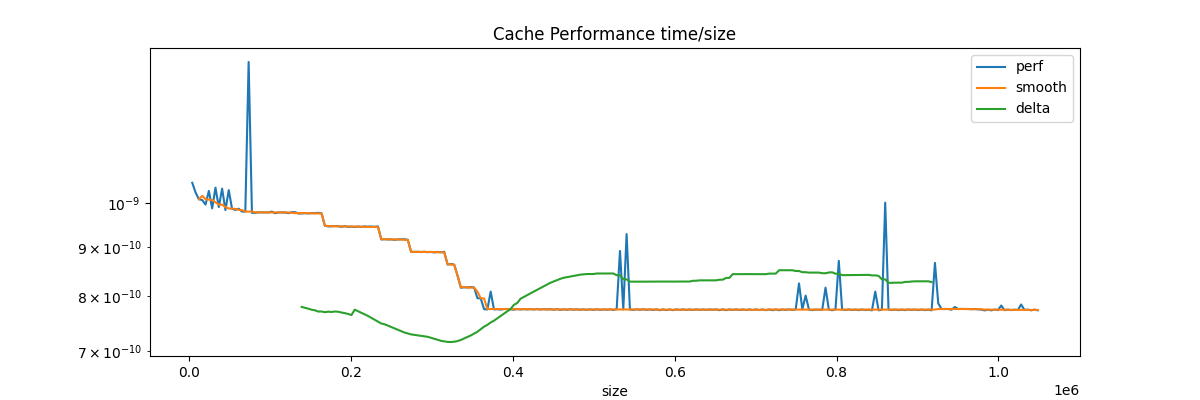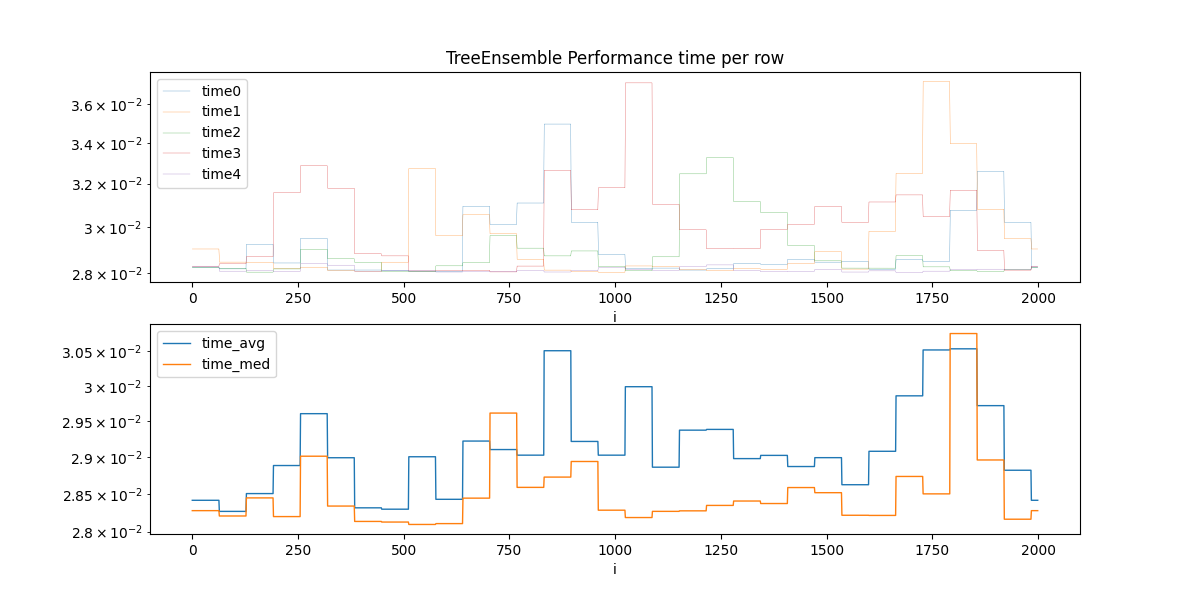Note
Go to the end to download the full example code
Measuring CPU performance#
Processor caches must be taken into account when writing an algorithm, see Memory part 2: CPU caches from Ulrich Drepper.
Cache Performance#
from tqdm import tqdm
import matplotlib.pyplot as plt
from pandas import DataFrame, concat
from sphinx_runpython.runpython import run_cmd
from onnx_extended.ext_test_case import unit_test_going
from onnx_extended.validation.cpu._validation import (
benchmark_cache,
benchmark_cache_tree,
)
obs = []
step = 2**12
for i in tqdm(range(step, 2**20 + step, step)):
res = min(
[
benchmark_cache(i, False),
benchmark_cache(i, False),
benchmark_cache(i, False),
]
)
if res < 0:
# overflow
continue
obs.append(dict(size=i, perf=res))
df = DataFrame(obs)
mean = df.perf.mean()
lag = 32
for i in range(2, df.shape[0]):
df.loc[i, "smooth"] = df.loc[i - 8 : i + 8, "perf"].median()
if i > lag and i < df.shape[0] - lag:
df.loc[i, "delta"] = (
mean
+ df.loc[i : i + lag, "perf"].mean()
- df.loc[i - lag + 1 : i + 1, "perf"]
).mean()
0%| | 0/256 [00:00<?, ?it/s]
53%|#####2 | 135/256 [00:00<00:00, 1344.02it/s]
100%|##########| 256/256 [00:00<00:00, 742.99it/s]
Cache size estimator#
cache_size_index = int(df.delta.argmax())
cache_size = df.loc[cache_size_index, "size"] * 2
print(f"L2 cache size estimation is {cache_size / 2 ** 20:1.3f} Mb.")
L2 cache size estimation is 1.398 Mb.
Verification#
try:
out, err = run_cmd("lscpu", wait=True)
print("\n".join(_ for _ in out.split("\n") if "cache:" in _))
except Exception as e:
print(f"failed due to {e}")
df = df.set_index("size")
fig, ax = plt.subplots(1, 1, figsize=(12, 4))
df.plot(ax=ax, title="Cache Performance time/size", logy=True)
fig.savefig("plot_benchmark_cpu_array.png")

L1d cache: 128 KiB (4 instances)
L1i cache: 128 KiB (4 instances)
L2 cache: 1 MiB (4 instances)
L3 cache: 8 MiB (1 instance)
TreeEnsemble Performance#
We simulate the computation of a TreeEnsemble
of 50 features, 100 trees and depth of 10
(so nodes.)
dfs = []
cols = []
drop = []
for n in tqdm(range(2 if unit_test_going() else 5)):
res = benchmark_cache_tree(
n_rows=2000,
n_features=50,
n_trees=100,
tree_size=1024,
max_depth=10,
search_step=64,
)
res = [[max(r.row, i), r.time] for i, r in enumerate(res)]
df = DataFrame(res)
df.columns = [f"i{n}", f"time{n}"]
dfs.append(df)
cols.append(df.columns[-1])
drop.append(df.columns[0])
df = concat(dfs, axis=1).reset_index(drop=True)
df["i"] = df["i0"]
df = df.drop(drop, axis=1)
df["time_avg"] = df[cols].mean(axis=1)
df["time_med"] = df[cols].median(axis=1)
df.head()
0%| | 0/5 [00:00<?, ?it/s]
20%|## | 1/5 [00:00<00:03, 1.10it/s]
40%|#### | 2/5 [00:01<00:02, 1.10it/s]
60%|###### | 3/5 [00:02<00:01, 1.10it/s]
80%|######## | 4/5 [00:03<00:00, 1.09it/s]
100%|##########| 5/5 [00:04<00:00, 1.09it/s]
100%|##########| 5/5 [00:04<00:00, 1.09it/s]
Estimation#
Optimal batch size is among:
i time_med time_avg
0 512 0.028095 0.029010
1 576 0.028106 0.028431
2 448 0.028127 0.028298
3 384 0.028135 0.028317
4 1920 0.028164 0.028825
5 1024 0.028187 0.029988
6 192 0.028199 0.028890
7 64 0.028207 0.028269
8 1600 0.028215 0.029085
9 1536 0.028217 0.028628
One possible estimation
Estimation: 815.4414959215176
Plots.
cols_time = ["time_avg", "time_med"]
fig, ax = plt.subplots(2, 1, figsize=(12, 6))
df.set_index("i").drop(cols_time, axis=1).plot(
ax=ax[0], title="TreeEnsemble Performance time per row", logy=True, linewidth=0.2
)
df.set_index("i")[cols_time].plot(ax=ax[1], linewidth=1.0, logy=True)
fig.savefig("plot_bench_cpu.png")

Total running time of the script: ( 0 minutes 6.328 seconds)